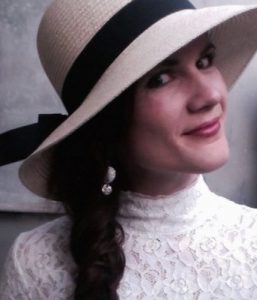I was first drawn to Bringing Down the Duke by Evie Dumore, by the cover. But I read the synopsis and knew I had to read this immediately! And when Berkley asked me to help promote Evie’s story? You bet I said yes! Berkley was kind enough to share an excerpt with us, so make sure to click through for more.
 About EVIE DUNMORE: Debut author Evie Dunmore wrote the EXTRAORDINARY LEAGUE OF WOMEN Trilogy inspired by the magical scenery of Oxford and her passion for romance, women pioneers, and all things Victorian.
About EVIE DUNMORE: Debut author Evie Dunmore wrote the EXTRAORDINARY LEAGUE OF WOMEN Trilogy inspired by the magical scenery of Oxford and her passion for romance, women pioneers, and all things Victorian.
In her civilian life, she is a strategy consultant with a M.Sc. in Diplomacy from Oxford. Scotland and the great outdoors have a special place in her heart, so she can frequently be found climbing the Highlands or hunting for woolly tartan blanket bargains.
Evie currently lives in Europe and pours her fascination with 19th century Britain into her writing. She is a member of the British Romantic Novelists’ Association (RNA).
Find Evie on the Web, Instagram and Twitter.
 Bringing Down the Duke by Evie Dunmore
Bringing Down the Duke by Evie Dunmore
Publisher: Berkley Jove Trade Paperback
Publish Date: September 3, 2019
Synopsis: A daring Oxford rebel takes on a powerful duke in a love story that threatens to upend the British social order. . . .
England, 1879. Brilliant but destitute Annabelle Archer is one of the first female students at Oxford University. Her scholarship demands that she recruit men of influence to champion the rising women’s suffrage movement. Her target: the cold and calculating Duke of Montgomery, commander of Britain’s politics.
But Montgomery wouldn’t be the kingdom’s greatest strategist if he couldn’t turn the tables and confront Annabelle with an altogether different offer. . . .
Locked in a battle with rising passion and impossible attraction, Annabelle will learn just what it takes to topple a duke.
Sounds amazing, right? Read an excerpt below.
It was a long walk past yards of empty table to reach her assigned chair. The footman pulled it back for her.
Montgomery was watching her with his neutral aristo expression. A diamond pin glinted equally impenetrable against the smooth black silk of his cravat.
“I trust it was not something in your room that had you rising this early?” he asked.
“The room is excellent, Your Grace. I simply don’t find it that early in the day.”
That sparked some interest in his eyes. “Indeed, it isn’t.”
Unlike her, he probably hadn’t had to be trained to rise before dawn. He probably enjoyed such a thing.
He hadn’t yet put his gloves on. His bare hands were resting idly on the polished table surface. Elegant hands, with long, elegant fingers. They could have belonged to a man who mastered a classical instrument. On his left pinky, the dark blue sapphire on the ducal signet ring swallowed the light like a tiny ocean
The footman leaned over her shoulder. “Would you like tea or coffee, miss?”
“Tea, please,” she said, mindful not to thank him, because one did not say thank you to staff in such a house. He proceeded to ask whether she wanted him to put a plate together for her, and because it would have been awkward to get up again right after sitting down, she said yes. In truth, she wasn’t hungry. The maid must have laced in her in more tightly than she was accustomed.
Montgomery appeared to have long finished eating. Next to his stack of newspapers was an empty cup. Just why had he ordered her to sit next to him? He had been immersed in his read. But she knew now that he was a dutiful man. Being polite was probably as much a duty to him as riding out into the cold to save a willful houseguest from herself. She would have to make a note on his profile sheet, very polite. As long as he didn’t mistake one for a social climbing tart, of course.
“You are one of Lady Tedbury’s political activists,” he said.
Her throat was instantly dry as dust.
“Yes, Your Grace.”
“Why?”
She could sense interest in him, genuine interest.
Cold sweat broke over her back. She had the ear of their greatest opponent, and the headache was jumbling her thoughts.
“I’m a woman,” she said. “It is only natural for me to believe in women’s rights.”
Montgomery gave a surprisingly Gallic, one-shouldered shrug. “Plenty of women don’t believe in this kind of women’s rights. And whether the 1870 Property Act is amended or not will not make a difference for you personally.”
There it was again, the arrogance. Of course he had guessed she didn’t have any property to lose to a husband, and thus no voting rights to forfeit. His arrogance was most annoying when it was right on the truth.
“I also believe in Aristotelian ethics,” she said, “and Aristotle says that there is greater value in striving for the common good than the individual good.”
“But women didn’t have the vote in the Greek democracies,” he said, a ghost of a smile hovering over his mouth. One could almost think he was enjoying this.
“They forgot to include women’s rights in the common good,” she muttered. “An easy mistake; it seems to be forgotten frequently.”
He nodded. “But then what do you make of the fact that men without property cannot vote, either?”
He was enjoying this. Like a tomcat enjoyed swatting at a mouse before he ate it.
Her temples were throbbing away in pain.
“Perhaps there should be more equality for the men as well, Your Grace.” That had been the wrong thing to say.
He slowly shook his head. “A socialist as well as a feminist. Do I need to worry about the corruption of my staff while you are here, Miss Archer? Will I have mutiny on my hands when I return from London tomorrow?”
“I wouldn’t dare,” she murmured. “There’s probably a dungeon under the house.”
He contemplated her with a hawklike gaze. “Oh, there is.”

